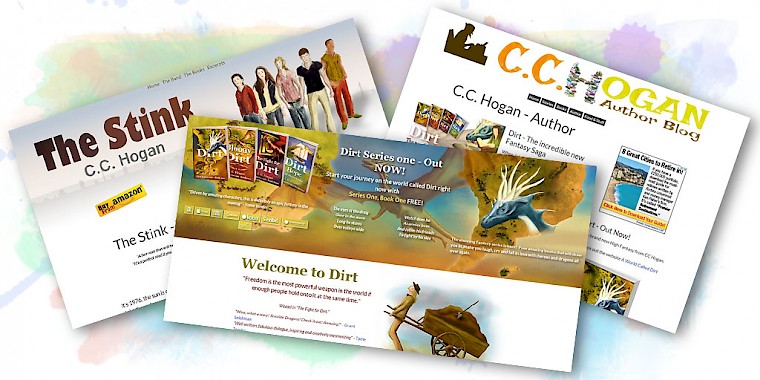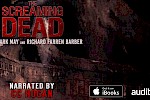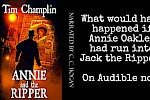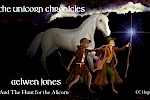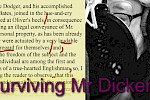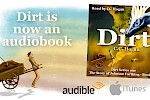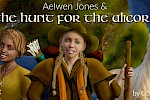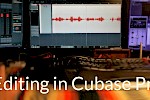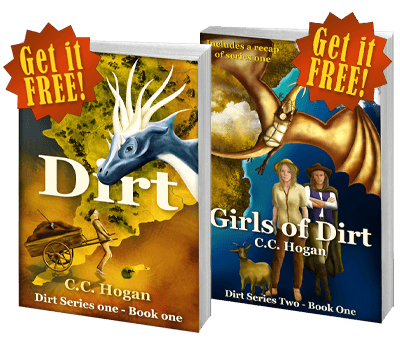You can't put everything in your book.
It is common, though by no means universal, for authors to have personal websites. Pretty much mandatory in the #IndieAuthor world, they allow an author to list their books for promotional purposes and have some interaction with their readers and visitors; through a writing blog, for instance.
But the internet is not just there as a point of contact for people, it is also a source of information which can be complementary to products and other services. If you buy a Dyson vacuum cleaner, for instance, the product website will list accessories for your machine that you may be interested in, provide the user manual in PDF form, give you warranty information, plus contact and repair services. Manufacturers who do not offer this information to customers are letting their customers down, and this might damage sales and customer loyalty.
Slightly closer to our creative home, major cinema releases will often be accompanied by a dedicated website. It will probably list release dates and so on, but will also contain trailers, perhaps interviews with cast and crew, and some even go as far as putting up games and other nonsense that not just attracts visitors, but offers something free for fans of the film.
Books, however, are often just listed on the site with a bit of blurb, a quick excerpt and a link to Amazon, and that is it. It seems a pity for something that may well have been in production for months and even years!
I currently have three core websites, not including social media sites.
- Writing Blog - You are on it now. But it also doubles as my central website and lists all my books, has the odd free short story and poem and has a subsection where I put recipes and other oddments that are not directly linked to writing. Oh, and my songs, and my audiobook tips.
- The Stink Books - This is the website dedicated to my book The Stink. This was my first foray into a dedicated website, and I am pretty pleased with it. Obviously, it is there to help promote the book, but it also adds some additional value for readers and potential readers. Since the book is about a young band in the 1970s, I have looked at the website as if it is a band fan site. I have profiles for each of the band members, including what they play and their influences, I have excerpts from the books and I have reproduced the lyrics. There is also an essay on there about London in the 1970s. If I write the sequel, the site will expand with even more information.
- A World Called Dirt - This site is to accompany my fantasy series Dirt and goes much, much further than other book websites I have seen outside of fan sites for Lord of the Rings. This is the website I want to look at here.
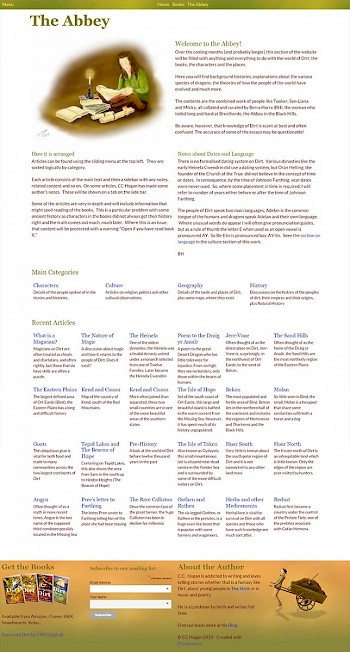 Adding value for readers
Adding value for readers
The inspiration for the A World Called Dirt website came from writing the book itself. Like all authors, I plan my books and have to do a certain amount of research. In my case, I needed to work out how big my world was, where the mountains were, how long it took people to travel, what they believed in and so on.
Although the story is fairly straightforward, despite its surprises, the world behind it is complicated; just like our world. It occurred to me that readers might like to read some of the background notes originally written for myself. These notes include lots of information that is not in the books, or at least only comes up in bits when needed for the story.
Generally speaking, stopping your story so that you can write a chapter on the religion of the local area just because you walked by a church, is seen as indulgent and is not popular with the reader. But that does not mean it is not interesting. So, why not put it on a website?
With Dirt, I have created a complete encyclopaedia that includes character lists, maps, geography information, language, pronunciation, religion, politics, history, culture, and even descriptions of the common herbs used for healing.
I have made this character written as if collated by an academic on Dirt, rather than by the author, but that is something that suits Dirt in particular.
Because Dirt is a High Fantasy, the need for such a resource is obvious, but this could apply to any book genre.
Perhaps you have written a thriller where guns are used a lot. The book website could list these arms complete with photos and descriptions.
If you write a historical romance, you have the opportunity for writing essays on the period, the locations and the people, as well as things like their clothing.
If you are a bit of an artist, you may want to include the odd illustration of your characters or locations.
If you are writing a contemporary novel based in a city, you may want to give lots of information about that as many of your readers may never have been there - I probably should give more about London on The Stink website.
I doubt there is a single genre out there that does not lend itself to additional information on a website that you would not normally put in the book.
Why should you do it?
There are two good reasons to create a dedicated website:
- Loyalty to your readers/fans by giving them something in return for putting up with you!
- Adding potential sales of the books.
The first of those two is obvious and with Dirt, that is the primary reason I am adding articles to The Abbey. It is every author's dream to build a fan base, but it is a terribly hard thing to do. The Abbey gives me one way other than just social media to connect with readers, and that is never a bad thing. The article on dragons has been read more than 12,000 times.
The second, adding potential sales, is a little more complicated and will work differently depending on the type of book.
From the technical, Search Engine Optimisation (SEO) point of view, a properly constructed website with lots of pages increases connection points with your product. The more places that people can find to reach your product, the higher the chance they will find you. You will already be aware that one of the criteria Google use to rank your website is the number of high-quality external links there are to your website, but Google also looks at the website itself. If you have lots of original content, cross-linking within your website, then that will be in your favour. Note, however, that duplicate information is not a good a thing!
(As a note, although some meta tags are important to search engines, they are more likely to analyse your visible content, and Google ignores meta keywords completely - has for years)
However, it goes further than that. Although my fantasy books and the website are still relatively young, I am getting visitors and I am monitoring them with both analytics and also, an inbuilt page hit counter. The home page has had several thousand hits and the book pages are doing well too. However, the article on Dragons is doing especially well and I suspect that this is because it is being found by people who are not necessarily looking for my books.
On a fantasy site, I am a little limited as to how I can leverage these kinds of visitors as most of my pages are geared towards my own invention, but with other genres, this could be a particularly useful way of attracting readers.
If you have written a book set in Victorian England, then the accompanying articles on the book's website may well attract visitors interested in that subject. Additionally, and rather usefully, not only are these visitors to your website that you would not normally expect, but they are also the perfect target audience for your book - they are interested in Victorian England.
Designing the Site
All of this only works, of course, if the website is properly designed.
Personally, I do not use services like Blogger, though they have their uses and the interconnection between users is nice, but I build my own websites from scratch.
This allows me to make sure the technical construction of the site is exactly geared towards what I need to achieve and that the SEO works exactly as I need. For instance, with A World Called Dirt, there is a logic to how the pages relate to each other so that when search engines list the site, they drill down and find all the pages and visitors do not get lost.
When I create a page, I have the opportunity to upload a special image that is exactly tailored to Twitter Cards and Opengraph (for Facebook), so that my articles display correctly on those networks.
Most Content Management Systems will allow you to do this, though will need some tailoring to your specific requirements. I use a system called @Processwire - It is much more powerful and flexible than Wordpress and Joomla, is much, much faster to load and is less prone to the security issues associated with those platforms. From my point of view, it also allows me to create specific forms for particular types of information in a better way than those other, older platforms
So, for instance, when I add a new character, I have fields for age, name pronunciation guide, which book they first appeared in and so on. What is more, I can upload those from a spreadsheet, so I was able to use my original notes directly - with hundreds of characters, that was a relief!
But you do not need to be quite so fussy as me - I am also a web developer, so that gives me a head start!
However you approach this, the design is critical. You are going to be giving far more information, including long articles, than with a straightforward promo site, so you need to make sure that the design is clear and easy to read.
It MUST be mobile friendly so that your readers can visit it on their tablets and phones as well as their laptop.
It should look like it has had the same amount of care as your book did - nicely laid out, good images, well written and so on. Remember, you are an author and your visitors will expect a higher level of literacy from you, especially if you want them to then read your books!
Should I really bother with this?
My personal feeling is yes.
We live in a multimedia world where the expectation is that everything has an addon. TV viewers want to be able to read up about their favourite programmes, DIY'ers want to learn new tips and tricks and study plans and manuals, everyone wants the user manual they threw away with the box by mistake, so there is no reason to suppose a book lover will not want the same thing.
As we indie authors write our books, we must consider this additional aspect to our work. Not only does it offer extra value to our readers, and increase the chance they will come back for more, but it may help bring the book to a wider audience; we all need that.
Can you help me?
Well, why not! Feel free to ask me more using the discussion form below and if you want me to consult on a website, please ask. (Note: I do not get involved with Wordpress sites, which is what most Authors will probably use. I is too cumbersom, old-hat and has too many security vulnerabilities for my liking)

